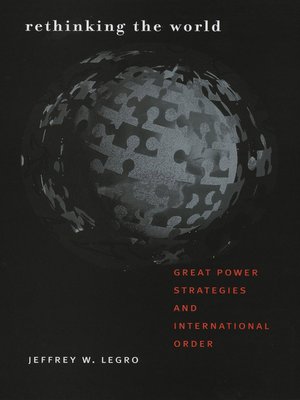Rethinking the World
ebook ∣ Great Power Strategies and International Order · Cornell Studies in Security Affairs
By Jeffrey W. Legro

Sign up to save your library
With an OverDrive account, you can save your favorite libraries for at-a-glance information about availability. Find out more about OverDrive accounts.
Find this title in Libby, the library reading app by OverDrive.



Search for a digital library with this title
Title found at these libraries:
| Library Name | Distance |
|---|---|
| Loading... |
Stunning shifts in the worldviews of states mark the modern history of international affairs: how do societies think about—and rethink—international order and security? Japan's "opening," German conquest, American internationalism, Maoist independence, and Gorbachev's "new thinking" molded international conflict and cooperation in their eras. How do we explain such momentous changes in foreign policy—and in other cases their equally surprising absence?
The nature of strategic ideas, Jeffrey W. Legro argues, played a critical and overlooked role in these transformations. Big changes in foreign policies are rare because it is difficult for individuals to overcome the inertia of entrenched national mentalities. Doing so depends on a particular nexus of policy expectations, national experience, and ready replacement ideas. In a sweeping comparative history, Legro explores the sources of strategy in the United States and Germany before and after the world wars, in Tokugawa Japan, and in the Soviet Union. He charts the likely future of American primacy and a rising China in the coming century.
Rethinking the World tells us when and why we can expect changes in the way states think about the world, why some ideas win out over others, and why some leaders succeed while others fail in redirecting grand strategy.







